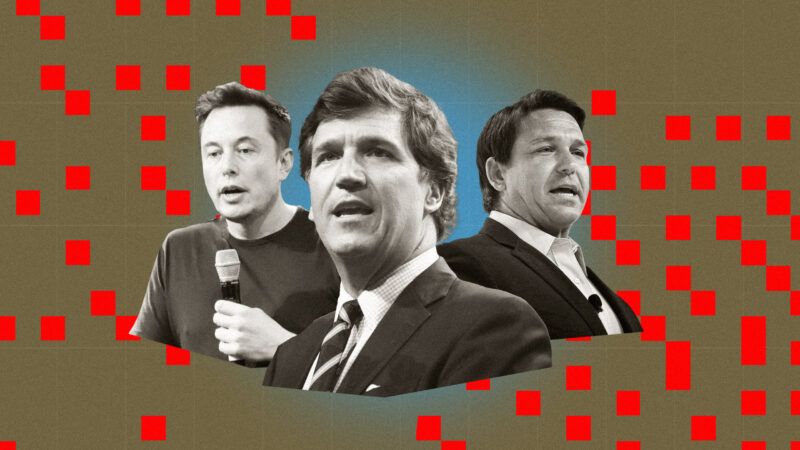How Ron DeSantis, Tucker Carlson, and Elon Musk Will Change the Section 230 Debate
Expect the very foundations of the internet to come under attack from politicians and the mainstream media.

Twitter is in the midst of a transformation: It is becoming a right-leaning news platform. This will have profound consequences for the debate about Section 230, the federal statute that shields websites from some liability created by users, which effectively allows the internet to function as a lightly restricted space.
Elon Musk purchased Twitter last year with the stated goal of making the site more hospitable to all kinds of political expression. But Musk is himself increasingly associated with the right; on Wednesday, Republican Florida Gov. Ron DeSantis announced his bid for the 2024 Republican presidential nomination during a Twitter Spaces live event alongside Musk, an avowed supporter of DeSantis.
Musk's Twitter is also attracting top conservative talent. After acrimoniously parting ways with Fox News, conservative superstar Tucker Carlson declared that he would relaunch his show on Twitter. The Daily Wire, a conservative media empire, recently decided to release all of its podcast videos on the site as well. "If Elon Musk stands by his commitment to make Twitter a home for free speech and delivers on monetization opportunities and more sophisticated analytics for content creators, I imagine we will invest even more into the platform," said Daily Wire CEO Jeremy Boreing.
Neither The Daily Wire nor Carlson appears to have special deals with Musk, who has said that they will be bound to the same rules as anyone else posting content on the site. But consider Musk's situation with respect to Carlson, and compare it to the host's previous relationship with Fox News.
After all, Carlson's departure from Fox News followed the resolution of the company's legal dispute with Dominion Voting Systems. Dominion sued Fox, arguing that its programming had been defamatory; guests who appeared on Fox News shows, including Carlson's, were accused of making false statements about Dominion. Under traditional defamation law, Fox News was liable for statements on Carlson's show.
Twitter is not.
As an online platform, Twitter cannot be sued in most cases for its users' speech. That's the entire point of Section 230: to empower websites to craft whatever speech policies are best for them, without forcing them to incur risk. Without Section 230, social media sites would have to moderate content far more aggressively. If Facebook and Twitter could be sued for users' speech, then they wouldn't be able to let users post at will, without approval or review.
"One advantage of Section 230 is it allows different platforms to try different models of online content moderation to serve specific audiences," says Jennifer Huddleston, a technology policy research fellow at the Cato Institute. "Recently, we've seen this with Elon Musk's changes to Twitter's content moderation rules in ways that create new opportunities for conservative news content."
At least prior to Musk's Twitter takeover, this underlying reality has vexed some on the right. Leading Republicans—including former President Donald Trump, Sen. Josh Hawley (R–Mo.), Sen. Ted Cruz (R–Texas), and others—have alleged unfairness, arguing that social media sites do not deserve this liability shield if they operate in a politically biased manner.
"With Section 230, tech companies get a sweetheart deal that no other industry enjoys," said Hawley.
While Republicans have railed against Section 230 for empowering social media sites to moderate too much content, Democrats have criticized it for the opposite reason: They want to punish Meta, Twitter, and Google for not censoring more content. Sen. Elizabeth Warren (D–Mass.) has proposed various schemes to make the sites liable for user content, on the theory that this would force the companies to take down alleged right-wing misinformation with greater vehemence.
Here's a prediction: If Twitter becomes the new home for right-leaning content, Republicans will have to rethink their ire toward Section 230; Twitter cannot exist without it. Democrats, on the other hand, will become much more vocal about the need to rein in tech and subject the platforms to the same liability standards as noninternet publishers. They will cast Section 230 as a giant loophole that allows Musk to evade responsibility for Carlson's speech. They will say that misinformation—the great crisis of our age, according to Democratic thinking—cannot be stopped so long as the platforms themselves are immune.
Section 230, of course, provides protection to everyone who wishes to express himself online. It is the reason that the internet has remained such a liberating, freewheeling place. Repealing or replacing it would risk damaging the very foundations of the largely unfettered discourse that exists on social media.
"Section 230 has been critical to protecting the speech of all users online by allowing platforms to carry user-generated content without the fear of business-ending litigation as result of how a user used their platform," says Huddleston. "The result is that a variety of voices, including conservative news voices, have more opportunities to connect with their audience thanks to online platforms."
Nevertheless, expect these foundations to come under even more strenuous attack from politicians and the mainstream media as Twitter becomes the right's new home.


Show Comments (138)